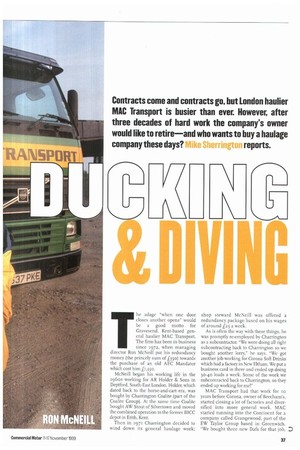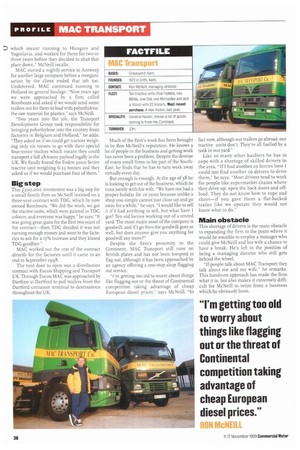Contracts come and contracts go, but London haulier MAC Transport
Page 39

Page 40

If you've noticed an error in this article please click here to report it so we can fix it.
is busier than ever. However, after three decades of hard work the company's owner would like to retire—and who wants to buy a haulage company these days? reports.
The adage "when one door closes another opens" would be a good motto for Gravesend, Kent-based general haulier MAC Transport. The firm has been in business since 1972, when managing director Ron McNeill put his redundancy money (the princely sum of i350) towards the purchase of an old AFC Mandator which cost him fi,35o.
McNeill began his working life in the 19605 working for AR Holder & Sons in Deptford, South-East London. Holder, which dated back to the horse-and-cart era, was bought by Charrington Coalite (part of the Coalite Group). At the same time Coalite bought AW Stout of Silvertown and moved the combined operation to the former BICC depot in Erith, Kent.
Then in 1971 Charrington decided to wind down its general haulage work;
shop steward McNeill was offered a redundancy package based on his wages of around £25 a week.
As is often the way with these things, he was promptly re-employed by Charrington as a subcontractor. "We were doing all right subcontracting back to Charrington so we bought another lorry," he says, "We got another job working for Corona Soft Drinks which had a factory in New Eltham. We put a business card in there and ended up doing 30-40 loads a week, Sonic of the work we subcontracted back to Charrington, so they ended up working for me!"
MAC Transport had that work for 10 years before Corona. owner of Beecham's, started closing a lot of factories and diversified into more general work. MAC started running into the Continent for a company called Grangewood, part of the EW Taylor Croup based in Greenwich. "We bought three new Dafs for that job, n
which meant running to Hungary and Yugoslavia, and worked for them for two or three years before they decided to shut that place down," McNeill recalls.
MAC started a nightly service to Antwerp for another large company before a reorganisation by the client ended that job too. Undeterred, MAC continued running to Holland on general haulage. "Nine years ago we were approached by a firm called Rombouts and asked if we would send some trailers out for them to load with polyethylene, the raw material for plastics," says McNeill.
Two years into the job, the Transport Development Group took responsibility for bringing polyethylene into the country from factories in Belgium and Holland," he adds. "They asked us if we could get tractors weighing only six tonnes to go with their special four-tonne trailers which meant they could transport a full 28-tonne payload legally in the UK. We finally found the Foden 3000 Series tractive unit weighing 6.23 tonnes and they asked us if we would purchase four of them."
Big step
This L200,000 investment was a big step for a small family firm so McNeill insisted on a three-year contract with TDG, which by now owned Rombouts. "We did the work, we got the tractive units, which were painted in TDG colours, and everyone was happy," he says. "It was going great guns for the first two years of the contract—then TDG decided it was not earning enough money and went to the factories to ask for a 15% increase and they kissed TDG goodbye."
MAC worked out the rest of the contract directly for the factories until it came to an end in September 1998.
The next door to open was a distribution contract with Eucon Shipping and Transport UK. Through Eucon MAC was approached by Dartline at Dartford to pull trailers from the Dartford container terminal to destinations throughout the UK.
Much of the firm's work has been brought in by Ron McNeill's reputation. He knows a lot of people in the business and getting work has never been a problem. Despite the demise of many small firms in his part of the SouthEast, he finds that he has to turn work away virtually every day.
But enough is enough. At the age of 58 he is looking to get out of the business, which he runs jointly with his wife. "We have not had a proper holiday for to years because unlike a shop you simply cannot just close up and go away for a while," he says. "I would like to sell it if I had anything to sell, but what have I got? Ten old lorries working out of a rented yard. The most major asset of the company is goodwill, and if I go then the goodwill goes as well, but does anyone give you anything for goodwill any more?"
Despite the firm's proximity to the Continent, MAC Transport still runs on British plates and has not been tempted to flag out, although it has been approached by an agency offering a one-stop shop flagging out service.
"I'm getting too old to worry about things like flagging out or the threat of Continental competition taking advantage of cheap European diesel prices." says McNeill. "In fact now, although our trailers go abroad, our tractive units don't. They're all fuelled by a tank in our yard."
Like so many other hauliers he has to cope with a shortage of skilled drivers in the area. "If I had another to lorries here I could not find another to drivers to drive them," he says. "Most drivers tend to work for people like supermarket chains where they drive up, open the back doors and offload. They do not know how to rope and sheet—if you gave them a flat-backed trailer like we operate they would not know what to do."
Main obstacle
This shortage of drivers is the main obstacle to expanding the firm to the point where it would be sensible to employ a manager who could give McNeill and his wife a chance to have a break. He's left in the position of being a managing director who still gets behind the wheel.
"If people talk about MAC Transport they talk about me and my wife," he remarks. This hands-on approach has made the firm what it is, but also makes it extremely difficult for McNeill to retire from a business which he obviously loves.
FACTFILE MAC Transport
BASED:
Gravesend, Kent.
FOUNDED:
1972 in Erith, Kent.
CONTACT:
Ron McNeill, managing director.
FLEET:
Ten tractive units (five Fodens, two MANs, one Daf, one Mercedes and and a Volvo) with 22 trailers. Most recent purchase: A new Foden. last year.
SPECIALITY:
General haulier, moves a lot of goods coming in from the Continent.
TURNOVER:
Elm.












































































































